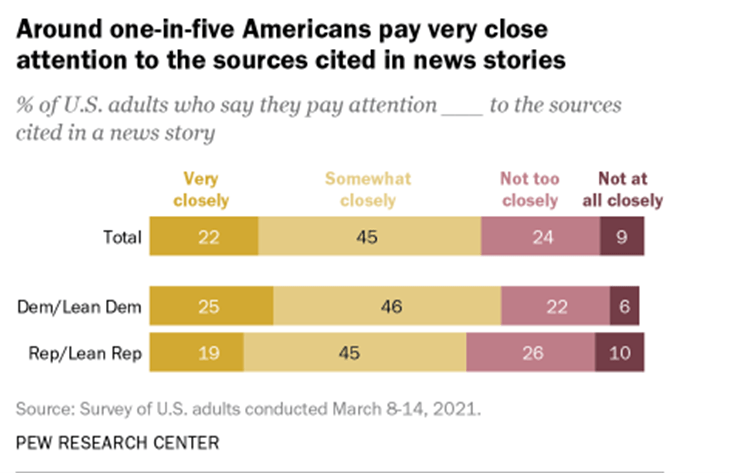How organizations plan to mark Juneteenth, Americans show deep concern for sources in news stories, and MLB explains new pitching rules enforcement
Also: Antitrust advocate becomes new FTC leader, National Parks manage crowds on Twitter, and Whole Foods offers rainy day insurance.
Hello, communicators:
The Senate has confirmed Lina Khan as the new chair of the Federal Trade Commission (FTC), who brings her reputation as an antitrust pioneer and advocate for breaking up big tech monopolies to her new role.
“The Biden administration’s designation of Lina Khan as Chair of the Federal Trade Commission is tremendous news,” Sen. Elizabeth Warren said in a statement Tuesday. “Lina brings deep knowledge and expertise to this role and will be a fearless champion for consumers.”
“Khan’s appointment signals an increased focus on antitrust regulation against major tech companies, which has been a focus of her legal scholarship,” reports The Verge. “Khan rose to prominence after a 2017 paper, titled “Amazon’s Antitrust Paradox,” arguing that new antitrust statutes were necessary to prevent anti-competitive behavior from online platforms like Amazon.”
Khan’s appointment also comes days after a bipartisan group of lawmakers introduced five landmark antitrust bills aimed at breaking up Google, Amazon, Facebook and Apple. Taken into consideration alongside new data that says informed consumers currently care more about their data security and privacy than any other issue, Khan’s leadership role at the FTC is another strong signal that change is coming which will soon dictate how social media platforms do business, with the potential to impact how you communicate with audiences on those platforms, too.
Here are today’s top stories:
Brands and organizations commemorate Juneteenth with self-reflection
The Senate has passed a law to make Juneteenth (June 19th) a federal holiday, and all states but South Dakota recognize the day and its significance. In 1865, the enslaved people of Galveston, Texas learned that they were free and that the Emancipation Proclamation had been passed, making the date the true end of slavery in the United States. As federal, state and local governments commemorate Juneteenth, brands and organizations are also finding ways to celebrate the day, too.
At the same time, private organizations are moving to recognize the day. organizations are moving to recognize the day. They include Blue Cross Blue Shield of Massachusetts, the University of Maryland, Nike, Uber, Twitter and many others. The private-company recognitions build on a wave that began last summer.
Ragan Consulting Group DE&I expert Kim Clark notes that the country needs an ongoing commitment to raising visibility and honoring significant events like Juneteenth. “I learned about Juneteenth as part of my university radio station promoting the on-campus Juneteenth celebration,” she says. “After college, in my corporate sphere, it wasn’t acknowledged until the summer of 2020.”
Why it matters:
Clark adds that organizations hoping to make external changes should start by raising internal awareness, providing education from within “and especially honor freedom by making Juneteenth a company holiday. Making people come to work that day misses the point if employees are required to work on a day celebrating their freedom.”
The holiday also offers an opportunity to get creative when sharing stories of how employees and other stakeholders are stepping up to serve the community. Give an update on the work your organization is doing to support communities of color and what work you still need to do to meet your goals.
Only if your employees are authentically engaged with these efforts should you share the work externally. When you do, Clark says, “[P]resent your efforts in the context of an example of the organization’s values in physical form, in action, by improving lives and making a difference.”
MEASURED THOUGHTS
A study by Pew Research has found that 67% of Americans pay somewhat close or very close attention to the sources cited in news stories to evaluate the accuracy of a report. Half of them also consider the news organization that publishes the story when deciding if the story is trustworthy.
Only 24% were concerned with the journalist who reported the story, while 6% were concerned with the story’s engagement on social media.

These numbers serve as a reminder that the authority and integrity of the sources who you offer to journalists matters, as does the outlet you choose to carry your message. Consider spending more time offering quality sources than stressing over the journalist who is covering your brand or industry.
If your CEO or leadership team are not the best mouthpiece for brand values and identities, consider offering independent experts in your industry who share your brand values and philosophy. Assume that readers, and especially journalists, will vet the sources who you offer in this increased time of media distrust.
TACTICALLY SPEAKING
Whole Foods Market has launched a weather-triggered promotion called Rainy-Day Redo that offers weekly prize packages to customers who check the brand’s Instagram account on summer afternoons each Monday, when The Weather Channel meteorologist Stephanie Abrams will determine if the previous weekend was deemed a “rain out” in at least 50% of the country.
If it rains on your summer parade, Whole Foods will offer a limited number of prize packages featuring summer-themed items including beach gear and snacks.
According to its press release:
“With everyone ready to get outdoors and enjoy the summer with family and friends, Whole Foods Market is the destination for summer celebrations big and small,” said Sonya Gafsi Oblisk, chief marketing officer of Whole Foods Market. “The Rainy-Day Redo program was designed to keep summer ON with giveaways, prizes and seasonal treats. Rainy days don’t stand a chance in dampening the fun.”

Courtesy of Whole Foods Market
While brands often launch campaigns that tie into specific holidays or cultural events, focusing on the weather is a clever way for Whole Foods to offer value to consumers looking to shake of their pandemic cabin fever and get outside with friends and family.
RAGAN’S 2021 BENCHMARK REPORT
Ragan has released its annual Communications Benchmark Report, an exclusive study from Ragan’s Communications Leadership Council that analyzes the major trends in the profession over the last year.
During that time, comms pros have been called on to develop and distribute messages on new policies that affect internal and external stakeholders alike. Their role has become more essential as they helped keep their organizations focused and moving forward. They’ve seen their access to the C-suite increase throughout 2020, and they forged important new alliances with peers in other departments, including HR, finance and workplace wellness.
Culled from more than 750 respondents, the 32-page report is available in its entirety exclusively to members of the Communications Leadership Council.
Download your copy of the exclusive Benchmark Survey Executive Summary today and get a crucial competitive advantage that will fuel your success for 2021 and beyond.
SOCIAL BUZZ
As Americans have increasingly ventured outside to cure their stay-at-home blues, national parks across the country face record crowds, parking lot overflows, and some have even been forced to turn visitors away after reaching capacity. As a result, many parks have relied on their social media accounts to manage crowd expectations.
Yellowstone has reported impressive visitor numbers, showcasing how its rangers are studying the impact that increased guest volume has on the land and the local communities:
Yellowstone hosted 483,159 recreation visits in May 2021. This is an 11% increase from May 2019 (434,385 recreation visits) and the park’s most visited May on record. Details at: https://t.co/w6YmTBRBHz pic.twitter.com/8ybjTBgMG4
— Yellowstone National Park (@YellowstoneNPS) June 11, 2021
News Release: A new NPS report shows 3.8 million people to Yellowstone in 2020 spent over $444 million in nearby communities. That spending supported 6,110 jobs in the local area and had a cumulative benefit to the local economy of $560 million. More: https://t.co/5NF8iYkP9H pic.twitter.com/uqXvgoCjTq
— Yellowstone National Park (@YellowstoneNPS) June 15, 2021
Did you know Yellowstone’s annual visits have increased by 1 million in the last decade? Using visitor use studies, transportation studies, and pilot projects, employees like Christina work to understand the impacts of increasing visitation. #WhatWeDoWednesdays pic.twitter.com/fP0aatT1rj
— Yellowstone National Park (@YellowstoneNPS) June 9, 2021
Arches, meanwhile, has used its channels to share real-time opening and closing information, with a cheerful addition of emojis:
⚠️Tuesday, June 15: The park is currently full, and we are temporarily delaying entries into the park. Vehicles attempting to enter the park will have to come back at another time.
Consider returning a few hours later or visiting other nearby attractions.
— Arches National Park (@ArchesNPS) June 15, 2021
⚠️Tuesday, June 15: The park is currently full, and we are temporarily delaying entries into the park. Vehicles attempting to enter the park will have to come back at another time.
Consider returning a few hours later or visiting other nearby attractions.
— Arches National Park (@ArchesNPS) June 15, 2021
😎Visiting Arches National Park? Here are a few pro tips:
✔️Follow @archesnps for traffic updates
✔️The park is busy. Pack your patience. Plan around the crowds: https://t.co/SzMnl6yTEX
✔️Check our current conditions page: https://t.co/bDepbq4Umx
✔️#RecreateResponsibly— Arches National Park (@ArchesNPS) May 6, 2021
Though using social media to communicate opening information amid changing weather conditions is nothing new, the National Park Serivce’s increased focus on crowd levels and the impact that those crowds have on the community emphasize several best practices for communication on social media, including the use of an emoji set to illustrate immediate meaning to brand journalism spotlighting employee stories and experiences that humanize the organization.
COMMUNICATIONS WEEK
Ragan is delighted to add industry event and thought leadership brand Communications Week to our portfolio. You can read the full press release here.
“We are reimagining Communications Week as a year-round endeavor,” says Ragan Communications CEO Diane Schwartz. “The rollout will begin next month with thought-provoking content on the future of communications on Commsweek.com, Ragan.com and PRDaily.com, culminating with a weeklong series in November that will feature conferences, networking events, workshops, webinars and more.”
The flagship event for 2021 will take place Nov. 15-19. Stay tuned for updates on the many opportunities and offerings that will help communicators connect, learn and celebrate their achievements later this year.
Major League Baseball announces guidelines prohibiting doctoring baseballs
Major League Baseball (MLB) has announced new guidelines to enforce rules that prohibit players from adding foreign substances to baseballs to improve the grip and spin in their pitching performance. As part of the rules, any player found to have a foreign substance on them or apply it to a ball in play will be benched and suspended for 10 additional games.
“After an extensive process of repeated warnings without effect, gathering information from current and former players and others across the sport, two months of comprehensive data collection, listening to our fans and thoughtful deliberation, I have determined that new enforcement of foreign substances is needed to level the playing field,” Rob Manfred, the commissioner of Major League Baseball, said in a statement.
Some players weren’t happy with the new guidelines, suggesting inconsistencies in its enforcement and umpire overreach:
“You’re giving out 10-game suspensions for cheating but you gave the Astros no suspensions at all… You can’t suspend the team that you actually knew was cheating during a playoff game?
White Sox pitcher Carlos Rodón calls out MLB commissioner Rob Manfred pic.twitter.com/RrZhOYpV2D
— Jomboy Media (@JomboyMedia) June 16, 2021
Umpires are the big winners here. @mlb just made them judge jury and executioner. If the umpire dislikes a player or a team, even if a pitcher has literally nothing on his hand, oops, sorry. 10 games. And there’s no way for a player to appeal. How do you argue that your hand
— Trevor Bauer (トレバー・バウアー) (@BauerOutage) June 16, 2021
What it means:
Manfred’s statement responds to fan complaints about doctored balls and poor game play, but he doesn’t address the criticisms form the other side of the issue (inconsistent enforcement of rules, etc.). Take note to anticipate the aspects of any new policies or guidelines that affected stakeholders will scrutinize and craft messaging that acknowledges those holes.
Statements with the potential to pit stakeholders with competing interests against each other are most effective when they find common ground with shared goals and values (such as the integrity of your product) and lean on data to support your decision beyond emotional feedback and opinion.
SOUNDING BOARD
Does your organization plan to commemorate Juneteenth, PR pros and communicators?
Does your organization plan to commemorate Juneteenth, PR pros and communicators? #DailyScoop
— PR Daily (@PRDaily) June 16, 2021
Is there a question you’d like to see asked? Let us know by tagging #DailyScoop!








In this excellent PR Daily report on what’s being done by America’s top PR teams, notice the contrast in action related to (a) Juneteenth, self-reflection and national communication, and (b) the inaction responding to threats from antitrust militants. Can anyone imagine why the PR teams of endangered companies are not doing more?
PR inaction is sometimes generated by direction from top management to “let’s say a minimum so we don’t stir up trouble.” But if one country moves up to its border a huge military force—eager fighters, missiles, planes and heavy equipment—is it sensible for the neighboring country to do nothing defensive in the hope of not stirring up trouble?
When Iranian mobs yell “Death to Americans!” and “Death to Israel,” that happens often and experience teaches us that Iranians don’t actually try to kill us. But if mobs yell “Death” to neighboring countries that are smaller and weaker and rich so invasion can be tempting, does inaction seem like tempting fate?
FTC’s appointment of this antitrust gladiator is hailed by Senator Warren as “tremendous news” but to major companies it’s like news of an armed shooter in the neighborhood. Only shooting people is against the law but pressing antitrust charges isn’t!
Just as many people don’t go to the doctor until something hurts, many managements may not want to even think about antitrust dangers and protective opportunities until–boom!—there are accusations on page one of Wall Street Journal and New York Times that our government is accusing the company of unlawful size and actions that are damaging the public.
So can a company do any PR now to protect itself? Definitely. Three things.
.1. USE THE PR PRINCIPLE OF PRIMACY: In a controversy, the side that gets to the public first tends to be believed more. The side that comes second and with contrary facts tends to be believed less by a public that has been conditioned to “know better.”
.2. USE THE MAGNITUDE OF PERIL PRINCIPLE: In a controversy, the side that presents bigger perils to the public is more likely to win. In this case
even veteran antitrust prosecutors are likely to argue passionately that what the company has been doing is “illegal.” So the public may want to protect the company much more if the company makes known NOW that what the company has been doing SAVES the public money, protects American JOBS, and serves the public in ways smaller companies can’t.
.3. USE YOUR “POSITIVE OPPOSITE” POWER. Argue not just that the charges aren’t true but that the “positive opposite” is true, that what the company is doing PROTECTS THE PUBLIC against higher prices and fewer jobs because what’s actually illegal is what’s being called for by enemies of the company and of the company’s customers.
The biggest danger in antitrust accusation situations may be not the accusers like the persuasive Lina Khan, not the publicity-seeking politicians like Elizabeth Warren, but the well-intentioned corporate leaders who order PR to “say a minimum so we don’t stir up trouble.”
NOW is the time when an endangered company should bring in for presentations veteran winners in Washington like APCO, Hill & Knowlton, and the Burson part of BCW. When you have an opportunity to do Protective PR to help save your company’s good name and tangible assets, that’s no time for a well-meaning management to give the mafia-like order: “Omerta!”
If you not only have the wisdom to take the PR Daily courses and join the PR Daily groups but also get non-PR executives to do so, you get not only reinforced knowledge of successful PR crisis-management techniques but also allies in the company who may help you get from management the freedom and budget you need so you can do what will succeed.
I am asked to better explain the Magnitude of Peril Principle.
Here’s the explanation.
If one side says a peril is that a company “is trying to get away with doing something ILLEGAL” and the other side accurately says that what accusers want would COST THE PUBLIC billions of dollars and thousands of jobs” and cause less convenience for the public, the “lost money, lost jobs and lost convenience” peril will be seen by tens of millions as a bigger peril than “doing something illegal.”
The Magnitude of Peril Principle is that the public tends to favor public policy decisions that will prevent BIGGER perils to the public rather than preventing smaller perils to the public.
This is important because what repeatedly wins in Washington as top Omnicom experts recently emphasized convincingly in PR Daily is the TRUTH. The more important-to-the-public your truth is compared to the truth alleged by the other side, the more likely it is that your truth will win for you.